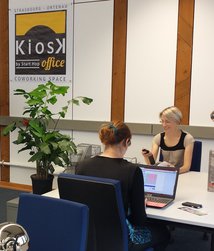Employment
Examples of projects and information services for cross-border workers
Many projects have been implemented to overcome the challenges involved in entering a cross-border labour market.
- Cross-border services for employment placements (France-Germany): five Franco-German cross-border placement services have been set up to encourage employment and alignment of supply and demand either side of the Rhine. Pôle Emploi (the French employment service) and Bundesagentur fûr Arbeit (its German federal counterpart) have been working together for several years on improving cross-border placement.
- “Réussir sans frontières/Erfolg ohne Grenzen” (Success without Borders): this Franco-German project planned for the 2016-2018 period aims to bring solutions to encourage workers’ integration in the cross-border labour market by coordinating and adapting professional education and training to employment vacancies. The project includes the creation of a bilingual website, professional training and apprenticeships, language classes and tools for accompanying service users through administrative procedures, jobseeker support workshops, and Franco-German drop-in services staffed by advisors, as well as mobility grants.
- Open House for Services for Germany (MOSA): opened in July 2015, the ‘Maison Ouverte des Services pour l’Allemagne’ is an information and support centre for inhabitants and businesses in the SaarMoselle cross-border area. It assists cross-border workers daily with their formalities (around 21,000 French residents working in Saarland).
- The Empleo project: the Nouvelle Aquitaine–Euskadi–Navarre Euroregion is leading the project “Strengthening Europe: developing an Aquitaine-Euskadi Euroregional job market catchment area”, funded by the POCTEFA Interreg programme. This project, planned for the 2016-2017 period, aims to carry out an audit of the current situation of cross-border employment at the scale of the border, deliver reference data on the subject, promote the Euroregion as a territory of economic opportunity and identify any obstacles to the free movement of workers. The project has led to the realisation of a study published in December 2017.
- “Skills Without Borders” (France–Belgium): launched on 1 October 2016 for a duration of 4 years, the project aims to bridge supply and demand in the cross-border labour market in the France–Wallonia–Flanders region, by encouraging cross-border occupational mobility (through the dissemination of information, and training).
- European Cross-Border Grouping “Employment Services”: at the heart of the French-Swiss cross-border region, the European Cross-Border Grouping (GTE), established in 1963, has set up an ‘employment service’ for jobseekers. More generally, the GTE works to inform and support border workers in legal, fiscal and social matters, between Switzerland and France. The GTE established European Cross-Border Centres in 2003 (one-stop-shop for cross-border information open to the public).
- The INFOBEST network – a network of information and advice centres for cross-border issues concerning France, Germany and Switzerland, established in the trinational Upper Rhine region since 1991. The INFOBEST network directly informs individuals, associations, businesses, public bodies etc., on cross-border issues in everyday life in the three countries. The INFOBEST centres have responded to 170,000 cross-border enquiries over around fifteen years. Since the end of the project’s EU operational program, the three neighbouring countries have been financing the network in equal measure, bringing it close in status to a trinational public service.
- “Frontaliers Grand Est”: Resource centre and association set up by the Grand Est Regional Council, it intervenes to facilitate occupational mobility across its borders.
- "Border People": the website "Border People" is a central access point for information on cross-border employment and mobility at the border between the Republic of Ireland and Northern Ireland.


